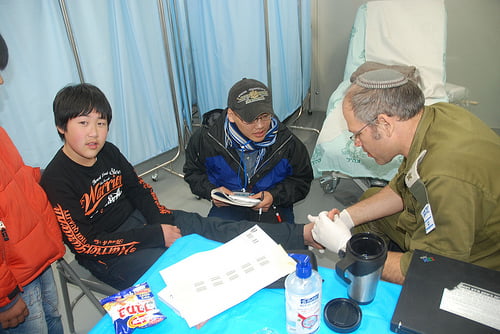Three days after the earthquake leveled Port-au-Prince last year, a foreign medical team set up a hospital in a soccer field with equipment and supplies unheard of in the rest of the broken city — an X-ray machine, a blood lab, an ultrasound and two incubators for babies who were born prematurely to traumatized mothers.
Now, at the cusp of Japan’s ground zero, where a whole village was dragged out to sea, the same foreign team has erected seven medical buildings. Equipped with many of the same supplies used by the team in Haiti, they are helping hundreds of survivors.
Your guess: the medical team comes from the United States? France? Canada?
No.
Israel.
“Forty countries around the world approached Japan and offered their (medical) assistance. We were the only ones to come,” Dr. Ofer Merin told me by phone from the remains of Minami-Sanriku, seven hours north of Tokyo. “It’s a real privilege.”
Merin is a cardiac surgeon at Jerusalem’s Shaare Zadek hospital. He is also the chief of the field hospital for the Israeli Defense Force’s reserve unit. The field hospital, he told me, is on call for national emergencies and since 1979, has travelled internationally on emergency humanitarian missions.
Japan is their 12th mission.
“If you drop our group in the middle of a desert we can work,” says Merin, who spent two years in Toronto a decade ago, working at Sunnybrook hospital.
I heard about the Israeli hospital in Port-au-Prince, but never saw it. It was mythical — while around most of the city, local and foreign doctors were reduced to civil war-era surgeries, cutting off infected legs with razor blades and no anesthetic, the Israelis offered their patents respirators and blood transfusions in specialized tent wards. A CBS reporter called it “the Rolls-Royce of emergency medical care.”
…
To continue reading this story click here
Via http://www.thestar.com
Photo by NASA Goddard Photo and Video
Related posts

Israeli Medical Technologies That Could Change The World

Harnessing Our Own Bodies For Side Effect-Free Weight Loss

Missing Protein Could Unlock Treatment For Aggressive Lung Cancer




Facebook comments